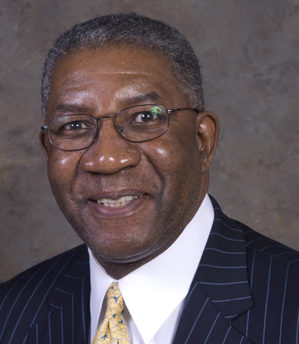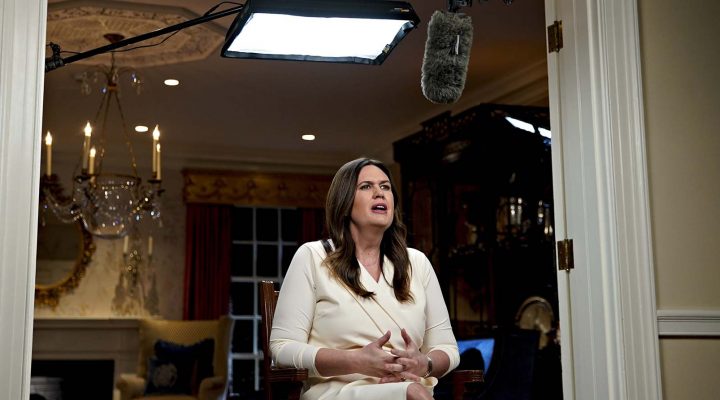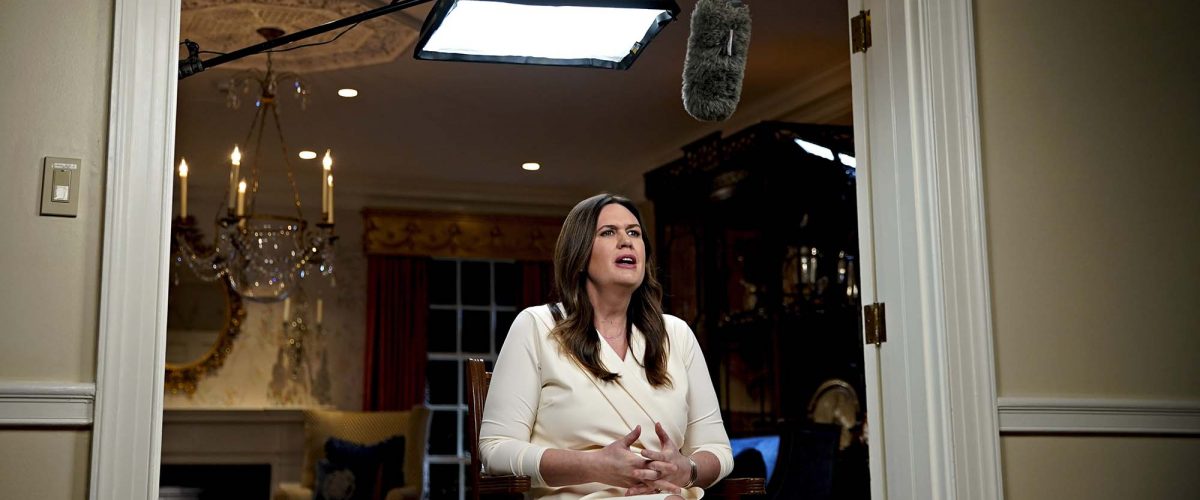The Merriam-Webster Dictionary identifies “defining moment” as a time that shows very clearly what something is really about. If that definition is taken seriously, the response by Arkansas Gov. Sarah Huckabee Sanders to President Joe Biden’s State of the Union address was a defining moment.
Sanders appears to think so, at least, judging by the words she spoke that night and the things she spoke about.
 She correctly spoke of herself as the youngest governor in the United States and contrasted her youth with Biden, who at 80 is the oldest president in U.S. history. In doing so, Sanders spoke of herself as part of a new generation of Republican leaders.
She correctly spoke of herself as the youngest governor in the United States and contrasted her youth with Biden, who at 80 is the oldest president in U.S. history. In doing so, Sanders spoke of herself as part of a new generation of Republican leaders.
But she showed Americans and the rest of the world that her “new generation” perspective is not new. There is nothing “new” about political censorship of public education. There is nothing “new” about maligning public health initiatives that protect the spread of a deadly pandemic. There is nothing “new” about using bigotry, prejudice and religious nationalism for political advantage. And there is nothing “new” about a politician (not to mention a generation of politicians) who lies about other people and what those other people believe in order to score political points.
Sanders signed Executive Order 23-05 the day she took office. It is true that executive order is titled: “Executive Order to Prohibit Indoctrination and Critical Race Theory in Schools.” But it is untrue — meaning a lie — to declare that “Critical Race Theory is antithetical to the traditional American values of neutrality, equality and fairness.” It is a lie to declare that CRT “emphasizes skin color as a person’s primary characteristic, thereby resurrecting segregationist values, which America has fought so hard to reject.”
“Sanders’ description of Critical Race Theory is categorically untrue, meaning a bald-faced lie.”
As a lawyer, retired jurist, former law professor, pastor and public theologian, I know those quoted words in Executive Order 23-05 to describe Critical Race Theory are not only inaccurate. I know Sanders’ description of Critical Race Theory is categorically untrue, meaning a bald-faced lie.
I also know Sanders’ categorically untrue characterization of Critical Race Theory is straight out of the Southern (I prefer to term it “Slaveholder”) Baptist Convention playbook that I denounced after the presidents of the six SBC-affiliated seminaries signed a joint statement opposing Critical Race Theory and intersectionality based on the assertion that “any version of critical theory is incompatible with the Baptist Faith and Message.”
Critical Race Theory is based on the view that one cannot accurately interpret and understand issues of social justice and public policy without analyzing how white supremacy and racism affect law, commerce, education, crime and punishment, public health, and community well-being.
Intersectionality is a theoretical framework first advanced by Kimberle Crenshaw, a law professor at the UCLA and Columbia University schools of law, that examines how multiple kinds of identity (such as race, gender, sex, class, ability, nationality/immigration status, sexual orientation) combine (intersect) to affect public policies and social justice. Crenshaw explains intersectionality in a TED Talk.
“There is nothing “new” when a politician utters a bald-faced lie about racial injustice.”
There is nothing “new” when a politician utters a bald-faced lie about racial injustice. Orval Faubus did so in Arkansas, George Wallace did so in Alabama, Ross Barnett did so in Mississippi, and other white politicians uttered bald-faced lies about efforts to remedy racial injustice long before Gov. Sanders falsely maligned Critical Race Theory as “indoctrination” the first day she took office.

Sarah Huckabee Sanders
Sanders graduated from Little Rock Central High School and SBC-affiliated Ouachita Baptist University. She is young, but by no means a political novice, having campaigned for her father, former Arkansas Gov. (and former SBC pastor) Mike Huckabee, as a field coordinator for the George W. Bush re-election campaign in 2004, as national political director for Mike Huckabee’s unsuccessful presidential campaign in 2008, and on the campaign staffs of several other politicians, including her father’s second unsuccessful presidential campaign that ended Feb. 1, 2016. Later that month, Sanders joined the communications staff of Donald Trump’s presidential campaign.
In July 2017, Sanders became the White House press secretary. She held that post until June 2019. The quoted language from Executive Order 23-05 that falsely describes Critical Race Theory as “antithetical to the traditional American values of neutrality, equality and fairness” is ironic coming from Sanders, who was Trump’s press secretary on Jan. 11, 2018, when Trump loudly referred to Haiti and African nations as “shithole countries” during a White House meeting with a bipartisan group of U.S. senators.
Although Sanders’ response to Biden’s State of the Union address has been described as “scathing” and “surly” there is a different and more morally appropriate word to describe it: “sinister.”
“There is a huge moral and ethical difference between political rhetoric that is ‘scathing’ or ‘surly’ and rhetoric that is ‘sinister.’”
The Oxford American Dictionary defines sinister as “suggestive of evil.” Roget’s Thesaurus defines sinister as “strongly suggestive of great harm, menace, or evil.” There is a huge moral and ethical difference between political rhetoric that is “scathing” or “surly” and rhetoric that is “sinister.”
Sinister rhetoric is what one reads about in Isaiah 59:3, with these words: “Your lips have spoken lies, your tongue mutters wickedness.”
Isaiah 59:4-5 makes the point unmistakably plain: “They rely on empty pleas, they speak lies, conceiving mischief and begetting iniquity. They hatch adders’ eggs and weave the spider’s web; whoever eats their eggs dies, and the crushed egg hatches out a viper.”
Later, in verses 9 and 10, the prophet “made it plain,” as J. Alfred Smith, pastor emeritus of Allen Temple Baptist Church in Oakland, Calif., would say:
Therefore, justice is far from us, and righteousness does not reach us; we wait for light, and lo! There is darkness; and for brightness, but we walk in gloom. We grope like the blind along a wall, groping like those who have no eyes; we stumble at noon as in the twilight, among the vigorous as though we were dead.
That plight results from political rhetoric that is “sinister.” We should not trivialize its ominous forecast by describing what Sarah Sanders said in response to the State of the Union as merely “scathing” or “surly.”
What Sanders said was evil, sinister and wicked. There is nothing “new” about it. That rhetoric and the societal harm it has produced across history, and in the present age, is old and ominous for America, Arkansas and the world.
Therefore … we wait for light, and lo! There is darkness; and for brightness, but we walk in gloom.
Welcome, to our “defining moment.”
Wendell Griffen is a recently retired circuit court judge in Arkansas who serves as pastor of New Millennium Baptist Church in Little Rock.
Related articles:
The gospel of fear as told by Al Mohler and Sarah Huckabee Sanders | Analysis by Rodney Kennedy
Spurred on by conservatives’ fears, Tennessee turns down federal funds to fight HIV/AIDS
Addicted to fear | Opinion by Mark Wingfield


